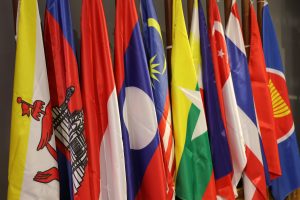Myanmar’s military government has announced that it will not participate in this week’s meeting of Association of Southeast Asian Nations (ASEAN) foreign ministers, after the bloc decided that Myanmar would only be invited to send a “non-political” representative.
At the start of the month current chair Cambodia announced that the junta’s foreign minister, Wunna Maung Lwin, would not be invited to the informal ASEAN Foreign Ministers’ Retreat, which will be held in Phnom Penh on February 16-17. The reason was the military’s lack of implementation of ASEAN’s Five-Point Consensus peace plan, which also saw Senior Gen. Min Aung Hlaing uninvited from last October’s virtual ASEAN Summit and related meetings.
In a statement that closely echoed its response to being excluded from the Summit, the junta’s foreign ministry stated that it was “regrettable to see the return of the decision made last year,” which it claimed was “contrary to the principles of national sovereignty and equality as stipulated in the ASEAN Charter, the Treaty of Amity and Cooperation in Southeast Asia, the Five Principles of Peaceful Coexistence, and the Charter of the United Nations.”
“In this regard,” it added, “Myanmar’s inability to participate or even designate a non-political representative to the AMM Retreat which will be held on 17 February 2022 is inevitable since it contradicts the principles and practice of equal representation in ASEAN.”
Despite earlier reports that the junta would dispatch Chan Aye, the permanent secretary of its Ministry of Foreign Affairs, the military has made the same decision as in October, when it declined to send any representative to the ASEAN Summit.
The move also suggests that ASEAN is once again coalescing around a unified approach to its errant member state. After taking over the bloc’s rotating chairmanship last October, current ASEAN chair Cambodia briefly flirted with a more direct form of engagement with the junta. Prime Minister Hun Sen said that he wanted Myanmar’s junta to attend future ASEAN meetings, and controversially traveled to Myanmar in January for direct talks with Min Aung Hlaing, becoming the first foreign leader to visit since the coup last February.
But after facing considerable resistance from within ASEAN – especially from Indonesia, Malaysia, Singapore, and the Philippines, which all insisted that the junta’s involvement in ASEAN processes be conditioned on good faith efforts to implement the Five-Point Consensus – Cambodia seems to have reverted to the bloc’s previous line. The Consensus includes calls for an immediate cessation of violence and for peaceful dialogue involving “all parties.”
Indeed, at one stage it seemed as if Cambodia’s chairmanship might even be derailed by the issue: last month, it was forced to postpone the ASEAN Foreign Ministers’ Retreat, originally scheduled for mid-January, after several ministers expressed “difficulties” in attending – most likely because of disagreements over Myanmar.
That said, the Myanmar military’s reaction to being uninvited from the informal foreign ministers’ meeting in Phnom Penh, as from the Summit in October, suggests that ASEAN’s harder line is unlikely to have much meaningful impact on its behavior. This points to the wider question lurking behind the debate about whether or not ASEAN should engage with the military junta, and on what terms: whether the junta values its membership in ASEAN more highly than the preservation of its coup and its own survival in the face of increasingly determined resistance, and whether the bloc has any meaningful leverage over the cloistered, insular military leadership.
As I suggested earlier this month, ASEAN has been placed in the unenviable position of trying to mediate a conflict in which neither side currently has much interest in dialogue, for good reason in the case of the anti-coup resistance. In this context, perhaps the best Cambodia can hope is to adopt a position of “do no harm”: while there might be no easy answers for how it can affect the situation in Myanmar for the better, it can certainly avoid making things worse.
































